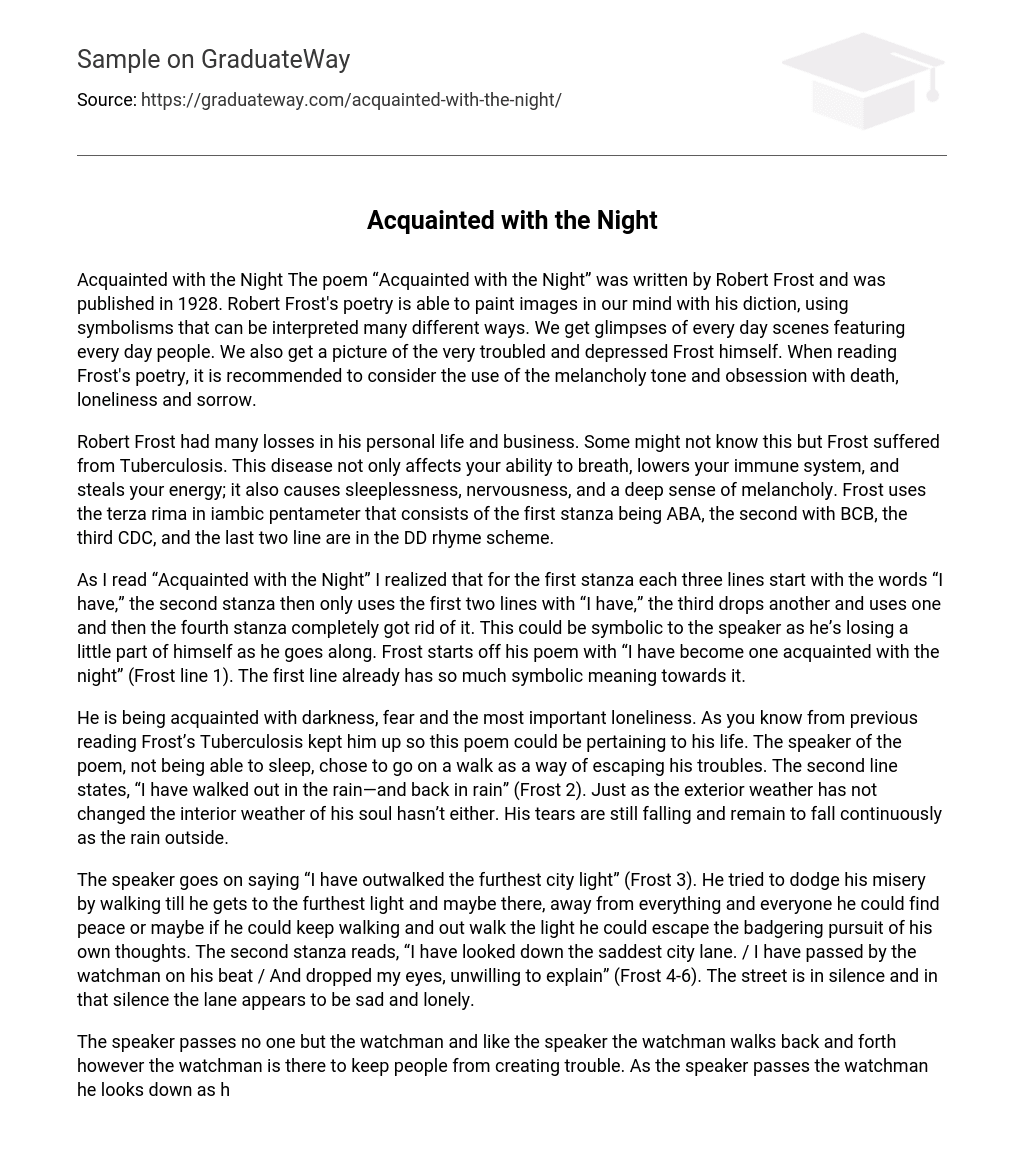Acquainted with the Night The poem “Acquainted with the Night” was written by Robert Frost and was published in 1928. Robert Frost’s poetry is able to paint images in our mind with his diction, using symbolisms that can be interpreted many different ways. We get glimpses of every day scenes featuring every day people. We also get a picture of the very troubled and depressed Frost himself. When reading Frost’s poetry, it is recommended to consider the use of the melancholy tone and obsession with death, loneliness and sorrow.
Robert Frost had many losses in his personal life and business. Some might not know this but Frost suffered from Tuberculosis. This disease not only affects your ability to breath, lowers your immune system, and steals your energy; it also causes sleeplessness, nervousness, and a deep sense of melancholy. Frost uses the terza rima in iambic pentameter that consists of the first stanza being ABA, the second with BCB, the third CDC, and the last two line are in the DD rhyme scheme.
As I read “Acquainted with the Night” I realized that for the first stanza each three lines start with the words “I have,” the second stanza then only uses the first two lines with “I have,” the third drops another and uses one and then the fourth stanza completely got rid of it. This could be symbolic to the speaker as he’s losing a little part of himself as he goes along. Frost starts off his poem with “I have become one acquainted with the night” (Frost line 1). The first line already has so much symbolic meaning towards it.
He is being acquainted with darkness, fear and the most important loneliness. As you know from previous reading Frost’s Tuberculosis kept him up so this poem could be pertaining to his life. The speaker of the poem, not being able to sleep, chose to go on a walk as a way of escaping his troubles. The second line states, “I have walked out in the rain—and back in rain”. Just as the exterior weather has not changed the interior weather of his soul hasn’t either. His tears are still falling and remain to fall continuously as the rain outside.
The speaker goes on saying “I have outwalked the furthest city light. He tried to dodge his misery by walking till he gets to the furthest light and maybe there, away from everything and everyone he could find peace or maybe if he could keep walking and out walk the light he could escape the badgering pursuit of his own thoughts. The second stanza reads, “I have looked down the saddest city lane. I have passed by the watchman on his beat /And dropped my eyes, unwilling to explain” . The street is in silence and in that silence the lane appears to be sad and lonely.
The speaker passes no one but the watchman and like the speaker the watchman walks back and forth however the watchman is there to keep people from creating trouble. As the speaker passes the watchman he looks down as he feels self-conscious and keeps walking. For the third stanza, the speaker is caught off guard by the “interrupted cry” in the distance. He stops walking to try to listen and “…stopped the sound of feet”. Yet the cry may be too distant but the speaker doesn’t bother to go any closer to hear.
Could it be that the physical distance could be a metaphor for emotional distance? That the speaker has lost a lover or the lover had lost the speaker? Anyways the cry was “…not to call me back or say good-by” . The speaker feels even more hopeless as he looks up into the sky “…at an unearthly height” and sees “One luminary clock against the sky” . Could this so called clock be a symbol of the distant moon in the sky? To go even further could the moon be represented as the watchman in the second stanza with gleaming rays that light up at night to prevent trouble makers from doing wrong?
The moonlight could be seen as the interrupting cry that gives partial light but not enough for one to see clearly what they’re doing, which then refers to an interrupted cry that hints little info but not enough to help heal a relationship. As time goes by it makes the speaker even more miserable, he realizes that it was the ticking of the clock that made him hear the interrupting cry. There could have been either too much time or not enough in the relationship but now the whole thing can’t be fixed. The concluding couplet “Proclaimed the time was neither wrong nor right. I have been one acquainted with the night. ”, can be interpreted that time can’t always determine the path that we choose is wrong or right because no one can be certain about what might of happened. Frost ends the poem with the same line as he started, it’s as if he started off with a single tear and each line drips with misery until finally he’s standing over a pool that is a reflection of his own misery.





